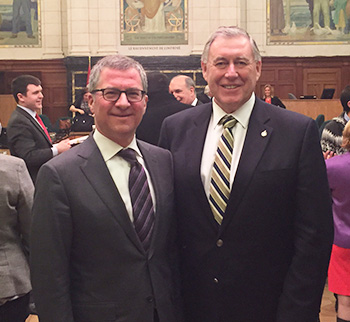The heads of the Centre for Israel and Jewish Affairs (CIJA), B’nai Brith Canada and the Friends of Simon Wiesenthal Center for Holocaust Studies (FSWC) all travelled to Ottawa last week to testify in support of the federal government’s controversial new anti-terror law, Bill C-51.
Between March 24 and 26, David Cape, chair of CIJA; B’nai Brith CEO Michael Mostyn, plus B’nai Brith’s national legal counsel Marvin Kurz and honorary counsel David Matas; and Simon Wiesenthal CEO Avi Benlolo presented individual statements before the House of Commons standing committee on public Safety and national security, which is reviewing the bill.
Critics say C-51 gives too much power without sufficient oversight to Canada’s spy agency, the Canadian Security Intelligence Service (CSIS), which would be given the ability to disrupt threats instead of just informing police about them.
In addition, they say the bill would threaten free speech by making it a crime to advocate or promote terrorism, and would allows federal agencies to share information about potential threats. They also say it raises concerns about privacy and could lead to protest groups being targeted for actions and statements that have little to do with terrorism.
But although their arguments in favour of the legislation weren’t identical, all three Jewish groups conveyed the concern that Jewish communities in western democratic societies are increasingly becoming the targets of terror, hate speech and hate crimes, and they argued Bill C-51 would offer viable and legitimate protective measures.
To bolster claims that the Jewish community is especially vulnerable, all three statements referenced examples of recent global terrorist attacks against Jews, such as the 2012 bombing of a Jewish tour bus in Bulgaria, the 2014 attack on the Jewish Museum in Brussels, this year’s attack on a kosher supermarket in Paris and the shooting of a Jewish guard in front of a Copenhagen synagogue.
They cite Al-Shabaab’s recent call for attacks against Jewish-owned businesses in North America and the fact that during their trial, it was revealed that two men who were eventually convicted of conspiring to attack Via Rail also had plans to kill “prominent members of Canadian society” and “rich Jews.”
“I strongly believe that [Jews] are targeted,” Benlolo told The CJN. “We’re seeing that a terrorist will ultimately not only seek out a general target, but will seek out the Jewish community.”
Here in Canada, he said, “we don’t know if a terrorist might attack a Jewish school or institution at any time.”
Although all three groups stressed the importance of the bill balancing civil liberties and the right to privacy and free speech with national security, they praised C-51 for its potential to root out terrorist threats.
Martin Sampson, CIJA’s director of communications, said that in order to formulate its testimony, CIJA conducted community consultations and invited legal experts to provide insight on the bill.
Respondents’ views varied widely, he said, and the resulting statement, which Cape presented March 26, represents “a significant consensus” in support of C-51.
In it, Cape outlines five areas that he said have “particular resonance with the Jewish community.”
For example, the bill’s pledge to empower courts to remove materials promoting terrorism would enable the removal of “vicious materials, often [those] calling for violence against Jews.”
Cape acknowledged critics’ concerns that this provision could cause “the censorship of odious ideas not directly linked to violence,” but he argued that the restriction “strikes an appropriate balance between freedom of speech and rights to life and security.”
While supportive of the proposed expansion of CSIS’ role to include disruption of potential terrorist attacks, Cape noted, “a concurrent and measured increase in the review of CSIS’ activities would be beneficial [to prevent abuses].”
B’nai Brith Canada’s submission, presented by Matas and Kurz on March 26, offered both support for the bill and several suggested amendments.
They first raised examples of threats to Jews worldwide, such as the Israeli Counter-Terrorism Bureau’s warning earlier this month that “global jihadi elements will likely seek to carry out additional attacks on Jewish and Israeli targets, particularly in western and northern Europe.”
The Jewish community understands “the tie between speech and action” they said, and thus, “properly tailored laws that target the promotion of terrorism are both permissible and necessary.”
Their testimony concluded with recommendations to help the bill avoid “vagueness and overbreadth” and “meet Charter [of Rights and Freedoms] standards.” For example, they urged that C-51’s prohibition on the promotion of “terrorism offences in general” more clearly define which offences are intended.
Benlolo, who spoke before the committee on March 24, outlined the threat to democracy posed by groups such as the Islamic State, Boko Haram, Hezbollah and Hamas.
Benlolo praised C-51’s proposal to increase information sharing between federal government agencies, as well as criminalize the promotion of terrorism.
“My concern is that many of those who have opposed this bill simply are not aware of the increasing threat of terrorism and the rising tide of hatred here in Canada, particularly on university campuses,” he said.
He emphasized the importance of having “sufficient legal and procedural mechanisms” to ensure that “our rights to privacy, peaceful protest and freedom of expression are in no way diminished.”
After giving his testimony, he told The CJN he feels the bill clearly distinguishes between peaceful protests and protests that incite violence.
“Somebody protesting for gay rights or the environment, that is perfectly legitimate,” he said. “Somebody protesting against another group, whomever they might be – gay, Jewish, Muslim – and calling for their death and destruction… We believe the bill is correct [to criminalize this].”
